Types and varieties of marigolds
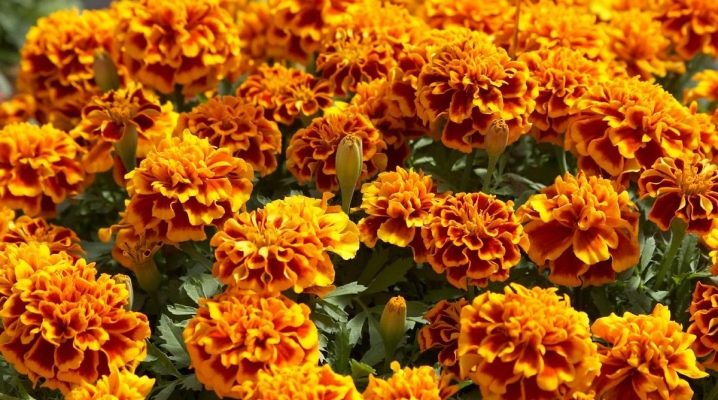
With the arrival of summer, the time comes for the bright sunny colors of marigolds. Tall and low, with thick terry caps or a bright center surrounded by a single row of petals, Tagetes attract attention all summer until the autumn frosts.
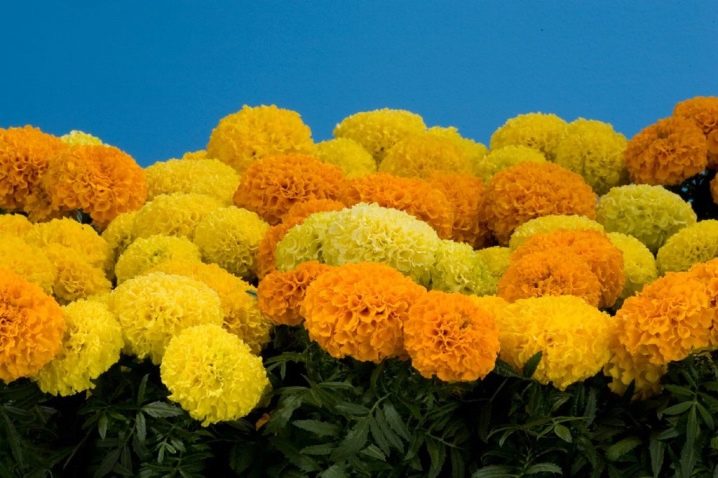
Classification
In the 16th century from America to Europe, the conquistadors brought a bright fragrant flower with a color reminiscent of the sun's rays, which later spread throughout Europe and Asia. Karl Linnaeus, together with a description of the plant in the middle of the 18th century, gave it the Latin name Tagétes. In Russia, these flowers are called marigolds because of the petals that resemble bright patches of delicate velvet. In other countries, they are called "Turkish carnation", "student flower", "Marigolds", which means "Mary's gold", or "black-haired".
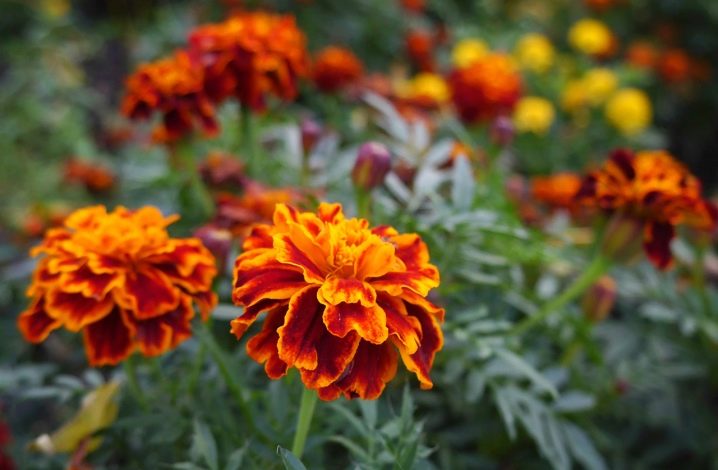
Today, there are more than 50 species of these plants used for the preparation of medicines, in ornamental floriculture, as well as in the form of a seasoning obtained from dried buds of some species.
Marigolds belong to the Compositae family, being relatives of asters. A herbaceous plant, cultivated mainly as an annual, forms a bush of upright branchy shoots from 0.2 m in height in dwarf species, to real giants, raising their flowers at a distance of more than a meter above the ground.
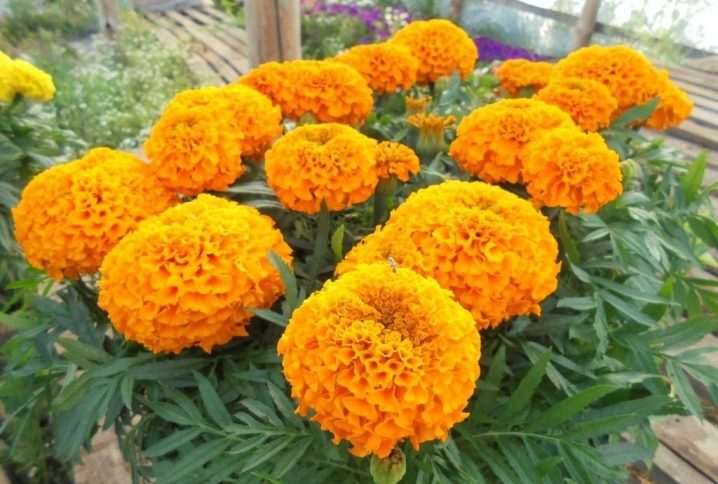
The root of the Tagetes in the form of a highly branched rod provides reliable support and nutrition for a heavy bush.
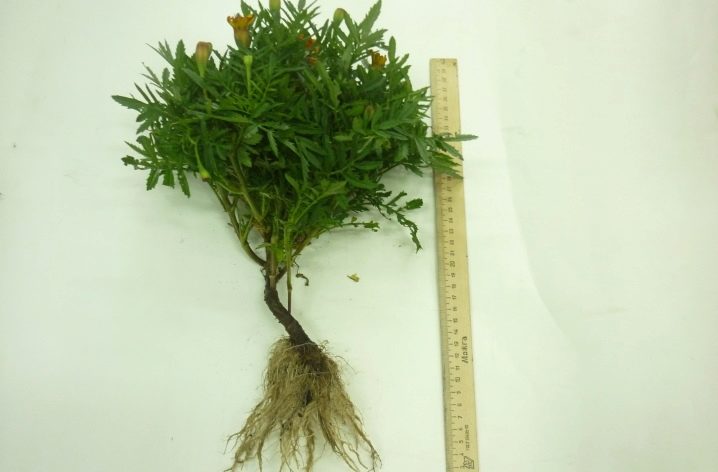
Strongly flattened elongated seeds of a dark brown, almost black color, ripening in cylindrical capsules formed by closed sepals, remain viable for several years. Perennial species of "Turkish carnation" can reproduce by self-seeding. Ripe seeds, falling to the ground, easily endure the winter, covered with a snow blanket, in order to start growing in early spring, forming dense shoots of young plants.
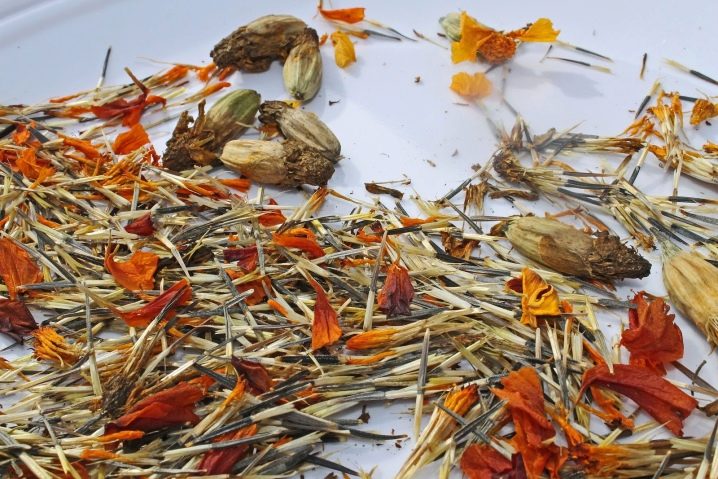
The flower has a pronounced odor that can repel pests and cause an allergic reaction in humans. Not only the buds have a specific aroma, but also the leaves of the plant, which can smell even stronger than a blossoming flower.
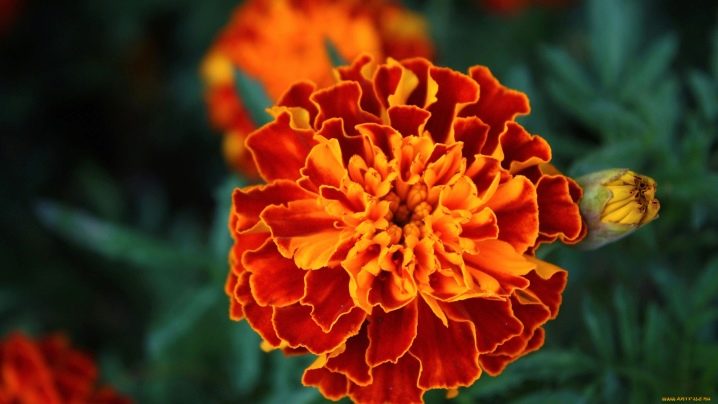
Marigolds differ in the shape of leaves and petals.
By the shape of the leaves
The leaves of marigolds are pinnate, separate or dissected, although they are found whole, with characteristic denticles along the edge of the plate. Structural veins are clearly visible against the background of greenery of various shades from light to dark.
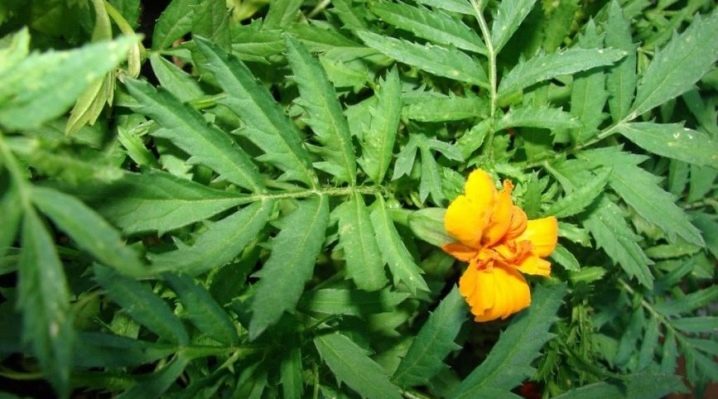
By the shape and number of petals
The characteristic varietal characteristic of the plant is shape and number of petals:
- cloves have reed-shaped petals;
- chrysanthemum with large tubular petals;
- the anemone ones combine the features of two types: the middle is formed from tubular petals, along the edge there are two rows of reed petals.
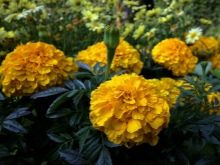

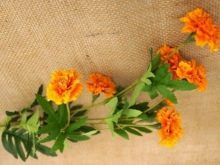
A basket-shaped inflorescence can resemble in shape the structure of a chamomile flower: be semi-double with a small number of rows of flower leaves or double, tightly filled with petals of the same type, or combined.
Main types
Florists mainly use hybrid varieties obtained by crossing different species. The most common are Tagetes patula L., distinguished by yellow flowers on erect stems.Shrub plants are tall and low, erect and deviated, with thin or regular leaves, small flowers or large tight double inflorescences.
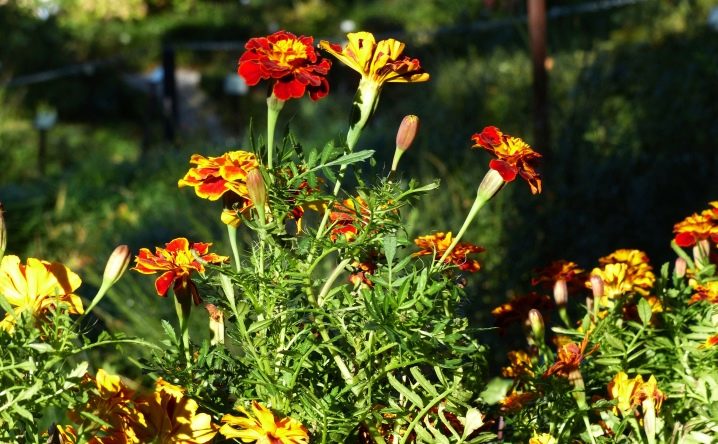
Dwarf
Low-growing varieties of marigolds are used as border plants, to create flower paintings, or as a potted flower. There are dwarf varieties among different types of Tagetes. Plant height does not exceed 0.45 m.
- "Carmen", with a spreading bush about 0.3 m high, belongs to the species of rejected marigolds. Clove inflorescences up to 60 mm in diameter have bright yellow cores framed by velvety red-burgundy petals.
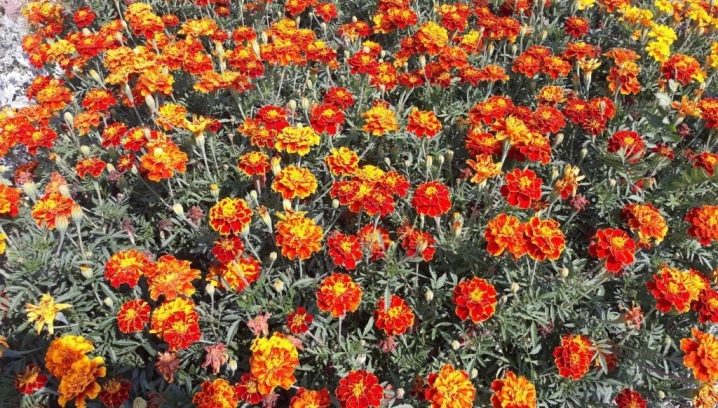
- "Naughty" or "Mischievous Marietta" differs in simple bright yellow five centimeter flowers with burgundy spots in the center of the petals.
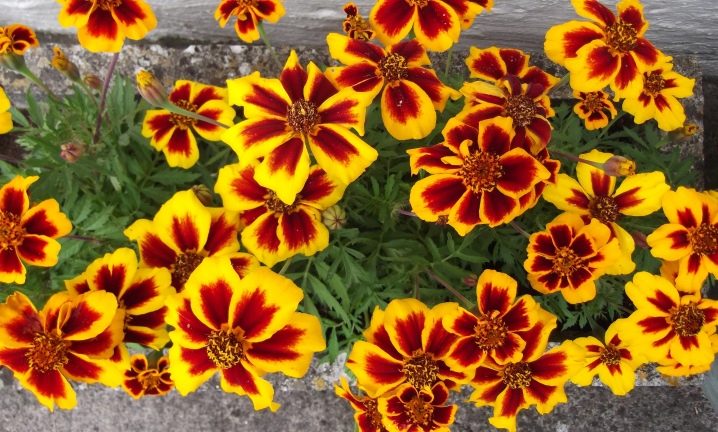
- "Petit Spray" with bicolor combined double flowers, reminiscent of a chrysanthemum, has a bright yellow center framed by red petals.
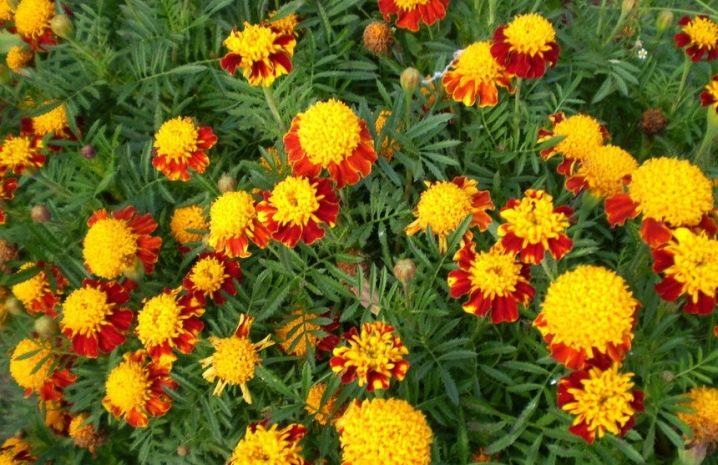
- Antigua Orange it is distinguished by large spherical caps of bright orange inflorescences with a diameter of 80 to 120 mm.
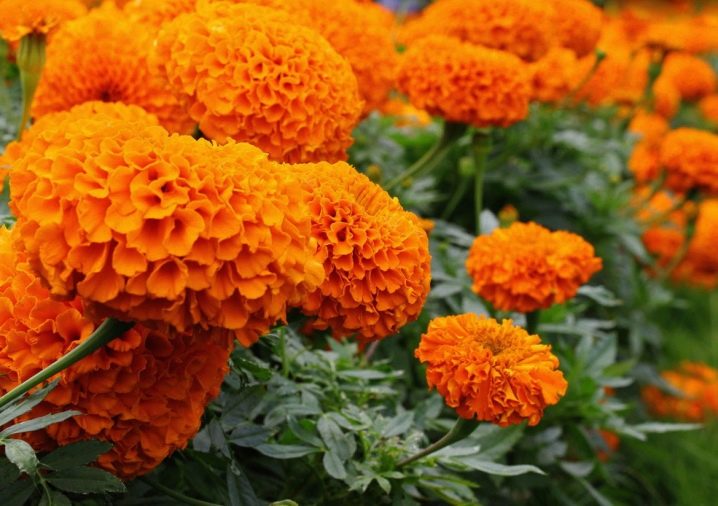
- "Funny Clown" lives up to its name. Its simple flowers have scarlet petals with a central yellow stripe.
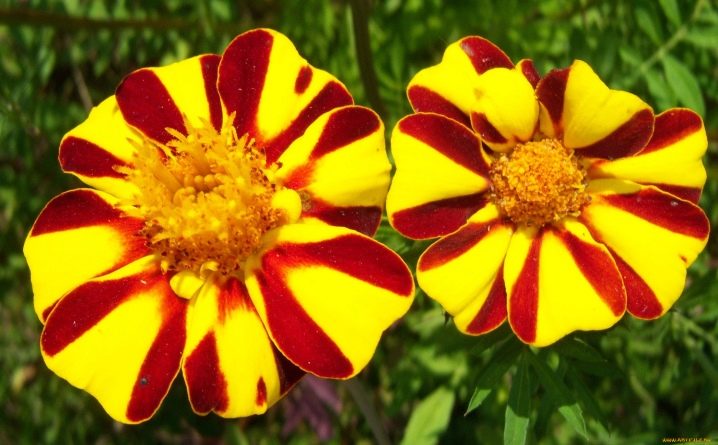
- Orange yellow Lunasi the shape of the flower resembles a chrysanthemum.
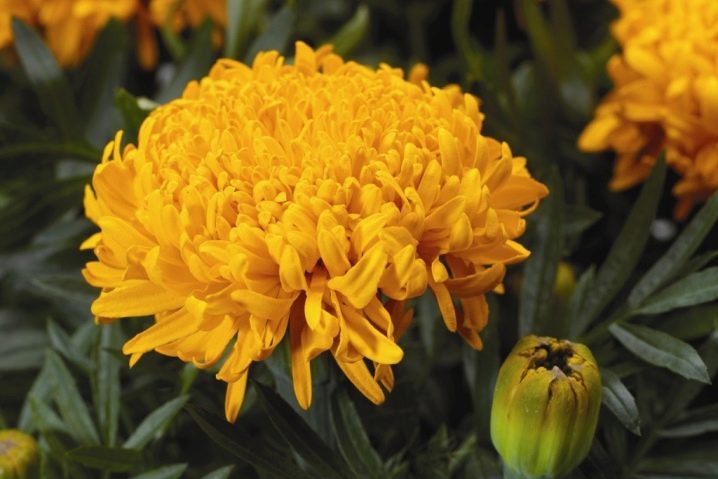
Tall
Tall bushes of flowering marigolds are suitable for decorating a fence zone, along the foundation of a house, in multi-level plantings or as a central element of a round flower bed. A large species diversity of tall tagetes pleases the eye with the richness of colors and shapes of inflorescences:
- high - up to 0.8 m - erect bushes with a large number of shoots of the variety "Hawaii" have double yellow-orange inflorescences of reed petals up to 150 mm in diameter;

- on one bush up to 0.7 m high variety "Fire ball" you can see four-centimeter buds of various colors: the upper inflorescences of a red-brown color, closer to the ground, are smoothly replaced by bright yellow flowers, as if plants of different varieties grow from one root;
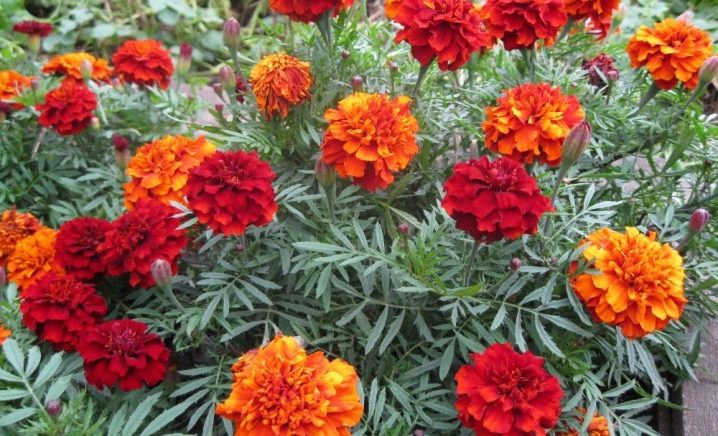
- marigold flowers Smiles in their color they resemble golden-red tongues of flame with a diameter of up to 70 mm, located on a bush with a height of 0.9 m;
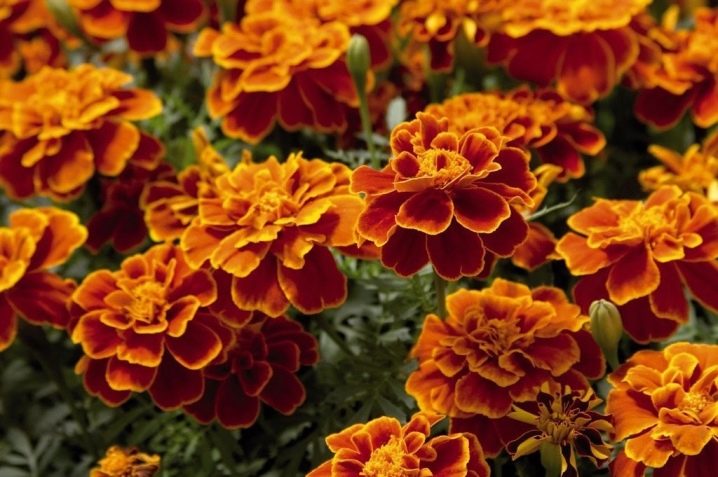
- orange-yellow carnation densely double inflorescences of the variety Lemon Queen proudly rise above the ground to a height of up to 1.25 m;
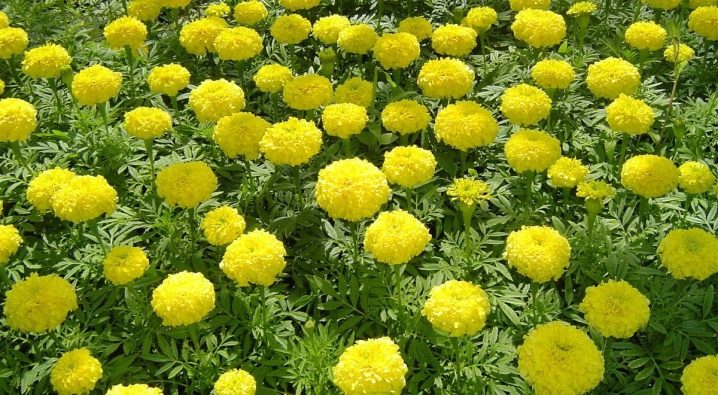
- tagetes "Shine" or "Glitters" are distinguished by high plant growth and double orange flowers;
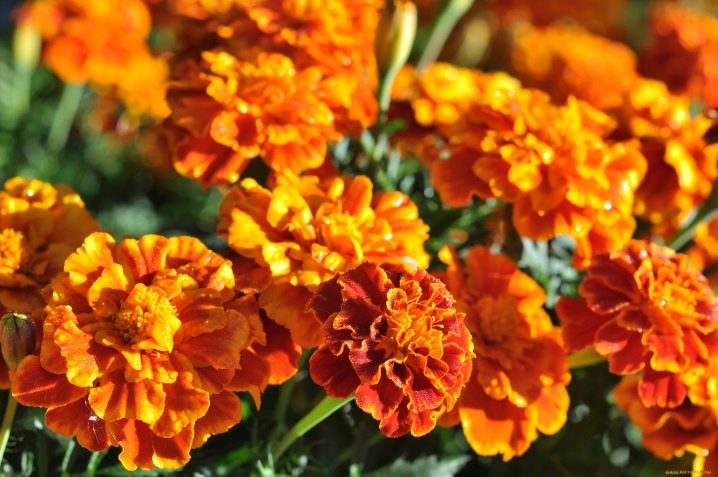
- "Mary Helen" - a tall hybrid with lemon-yellow flowers, similar to carnation inflorescences, with a diameter of about 100 mm;
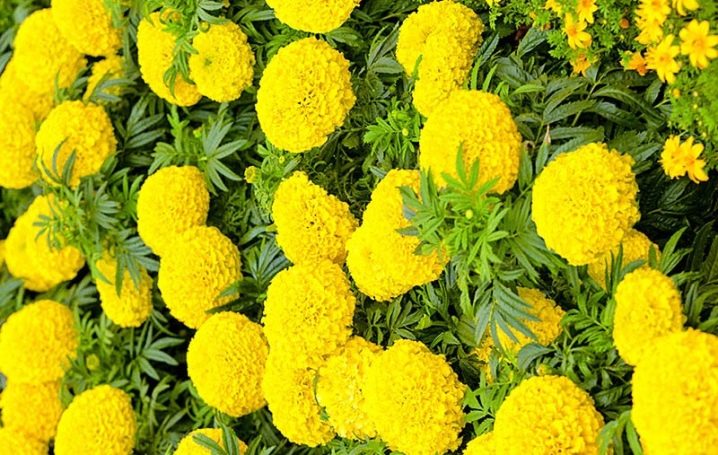
- Golden Fluffy has tall, spreading bushes about a meter high, decorated with bright yellow flowers resembling chrysanthemum.
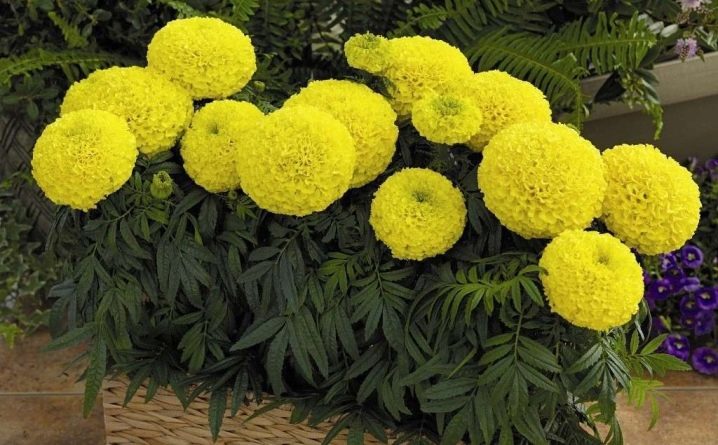
Erect
Erect or African marigolds have a strong single stem with many lateral shoots, forming a bush with a height of 0.2 to 0.8 m. Simple or double single inflorescences are located on long peduncles.
- Creamy yellow tagetes "Alaska" with large spherical inflorescences on the shoots of about 0.6 m in height, they delight with their flowering from July to the onset of the first frost.
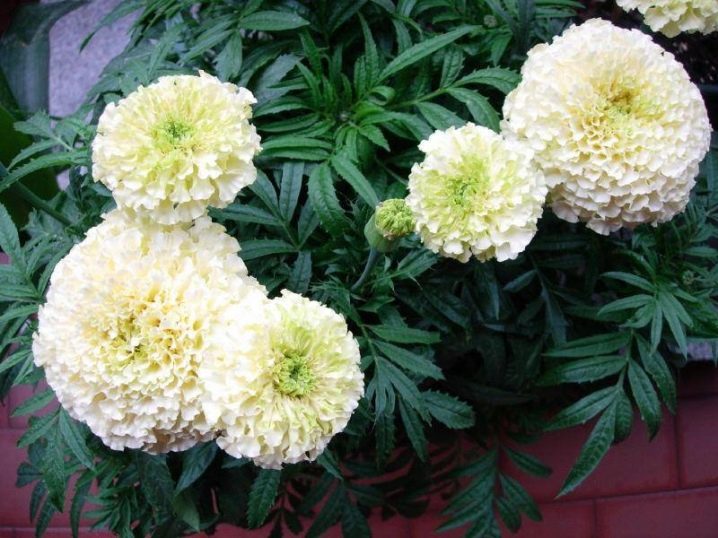
- Hybrid series marigolds "Perfection" They are distinguished by even round inflorescences of yellow, orange or golden color. Dense double flowers reach 150 mm in diameter. A short bush up to 0.4 m high and up to 0.35 m wide is suitable for borders, ridges and flower beds.
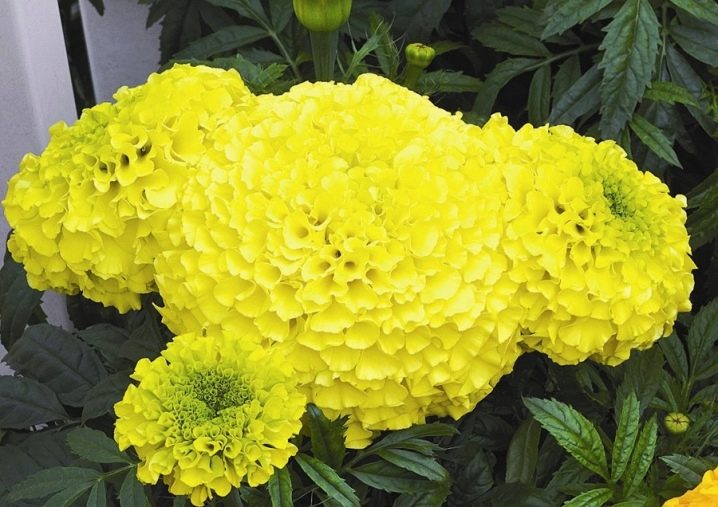
- White with a cream shade, the color of large densely double inflorescences of a rounded shape is a distinctive feature of the variety. "Albatross"... Low - 0.4 m - the bushes are suitable for flower beds, rabatki or other types of landscape gardening.
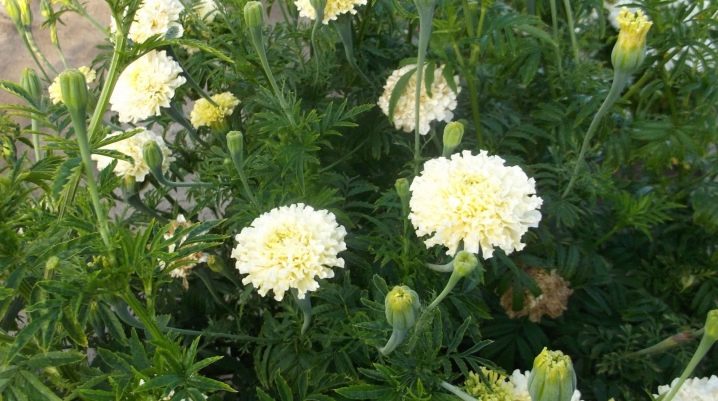
- "Gold dollar" - a tall compact dark green bush with double, spherical inflorescences of red-orange color up to 70 mm in diameter.
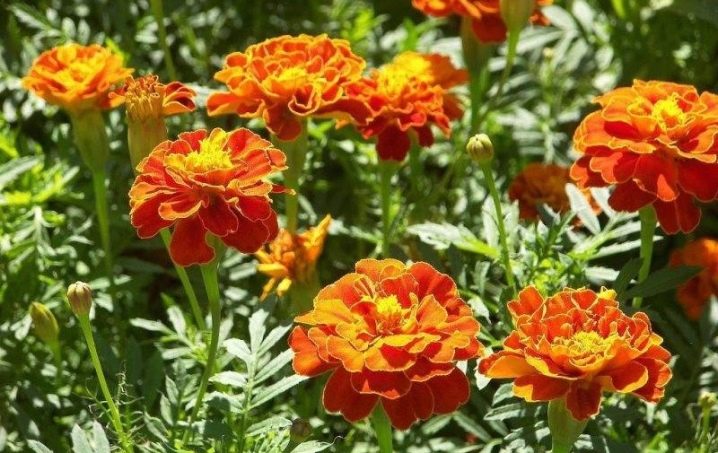
- The variety Goldlicht strong compact bush with light green shoots decorated with red veins.
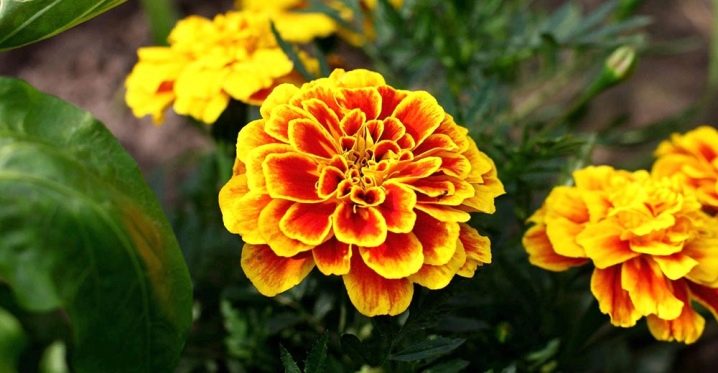
Against the background of large dark green leaves, the double hemispheres of orange-red reed petals look beautiful.
- Hybrid flower "Gilbert Stein" more like a spherical chrysanthemum of yellow-orange hue than tagetes. A tall, powerful bush with strong branching from the base proudly raises ten-centimeter inflorescences to a height of about 0.7 m. The variety is good not only in a flower bed, but also as a balcony decoration.
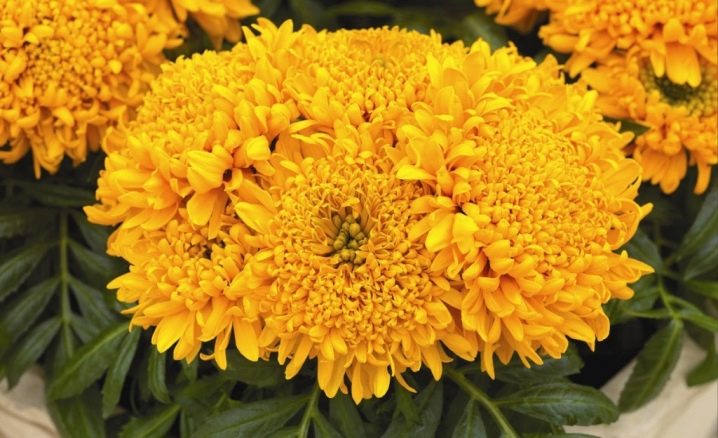
- Erect hybrid "Taishan Yellow" has a compact bush with dense, strong, 25–30 cm long, shoots topped with lush caps of bright yellow flowers with a diameter of 80–100 mm. Looks perfect in flowerpots and flower beds.
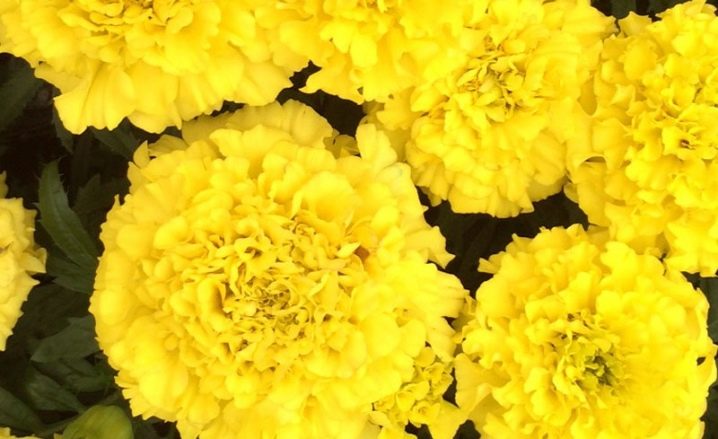
Rejected
Small-flowered marigolds - rejected or French - are distinguished by low growth of bushes, densely branching from the base. Small, single or collected in small scutes, inflorescences at the tops of the shoots are formed from tubular petals in the center and reed along the edges of the petals.
- "Chameleon pink" - a new variety of American selection is distinguished by a unique flowering: as they mature, semi-double flowers smoothly change color from yellow to burgundy.
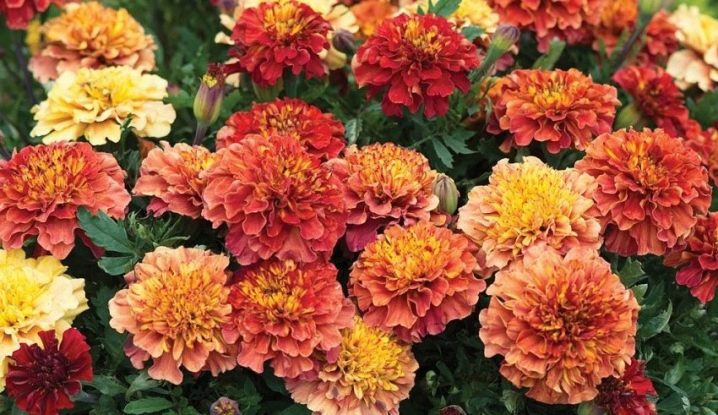
Low, equal in height and girth, bushes of lush greenery, decorated with unusual flowers, serve as a decoration of the garden from the beginning of summer until the first frost.
- Tagetes "Yellow heads" have a short, compact bush of strong, red-veined shoots topped with double chrysanthemum-shaped flowers of bright yellow tubular petals in the center and a border of one row of ligulate red slightly wavy leaves, bent downward.
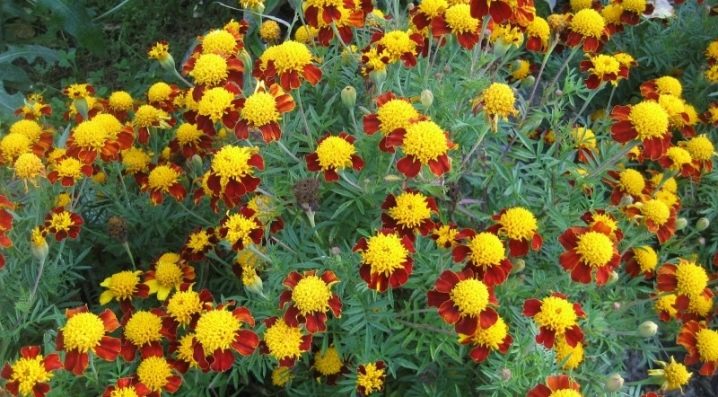
- "Rusti red" - a highly branched bush with lateral deflected shoots, decorated with dark red semi-double flowers up to 55 mm in diameter.
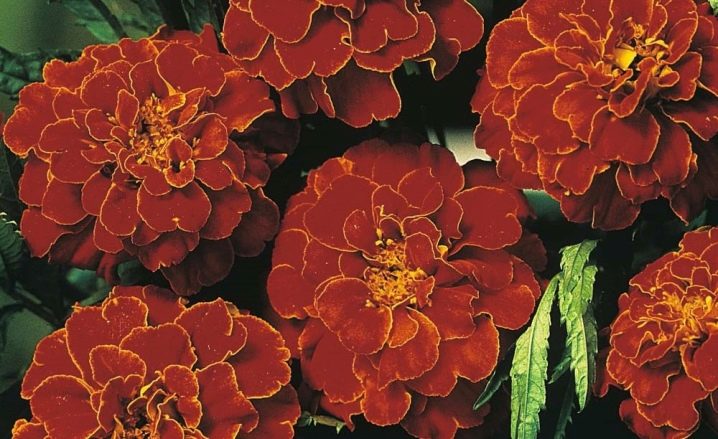
- Marigolds "Providence" - a new variety, ideal for growing as a pot culture. A lush flower, assembled from wavy petals, bright red in the center and dazzling yellow around the edge.
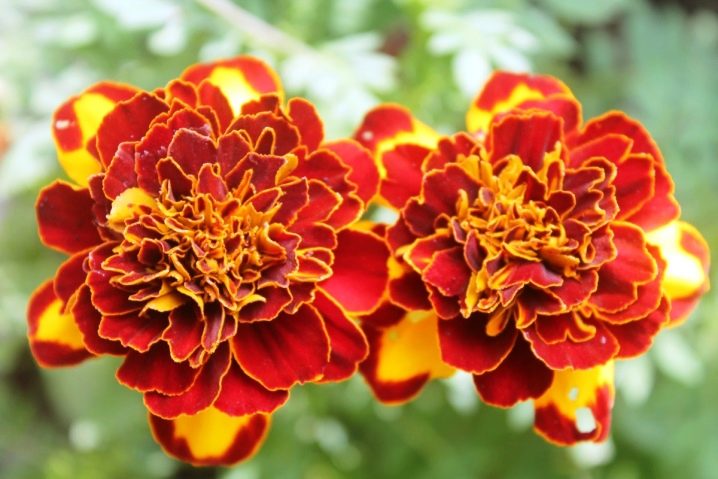
- Series "Petite" - one of the most popular among gardeners. Small double flowers of yellow and orange shades densely cover the compact bush. Up to 100 bright buds can bloom on one plant. This type is ideal for creating flower arrangements in flower beds.
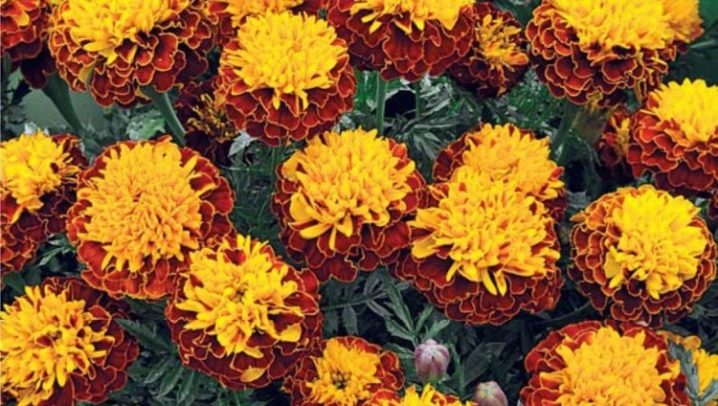
- A variety with a large "Russian" size of inflorescences, "Colossus" - an irreplaceable flower in any area. Elegant red-yellow numerous chrysanthemum-shaped flowers have long been loved by flower growers.
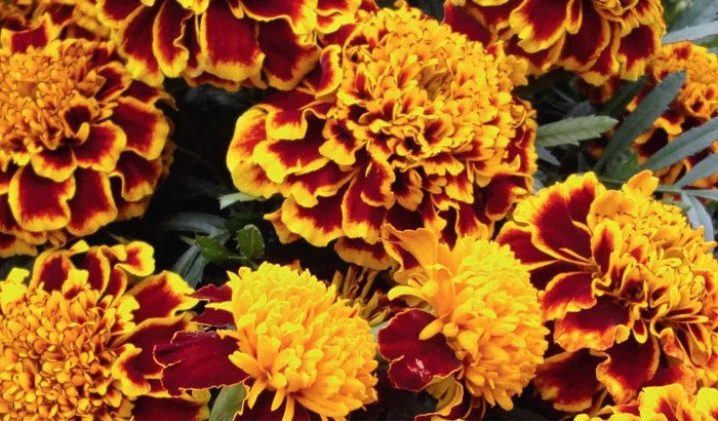
Thin-leaved
Delicate openwork greens of thin-leaved or Mexican marigolds are in perfect harmony with small flowers that cover the flowering bush with an even bright blanket. In the bulk, Mexican tagetes are low-growing species, suitable for use in decorating borders, carpet beds and for growing in containers. But there are also tall plants among them.
- "Mimimix" - a bright representative of the Mexican marigolds. A compact spherical bush with dark greens of thin pinnately dissected leaves, densely covered with red, yellow, orange flowers up to 2 cm in size.
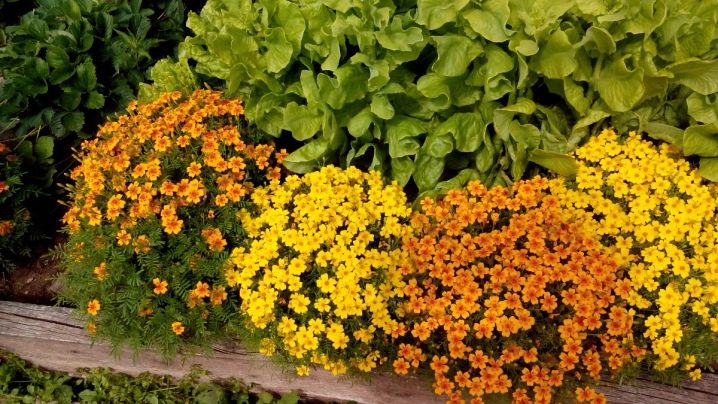
- Tall - up to 150 cm - fragile spreading bush Golden Ring strewn with yellow three-centimeter flowers.
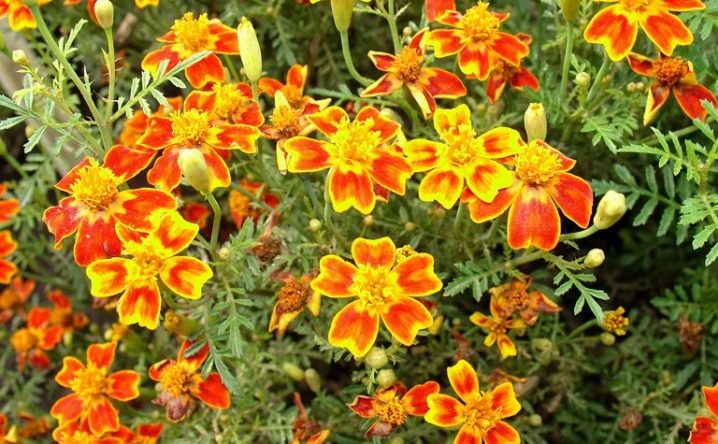
- Variety "Paprika" suitable for any landings. Its spherical bush of thin-leafed shoots is adorned with a carpet of simple five-petalled red flowers.
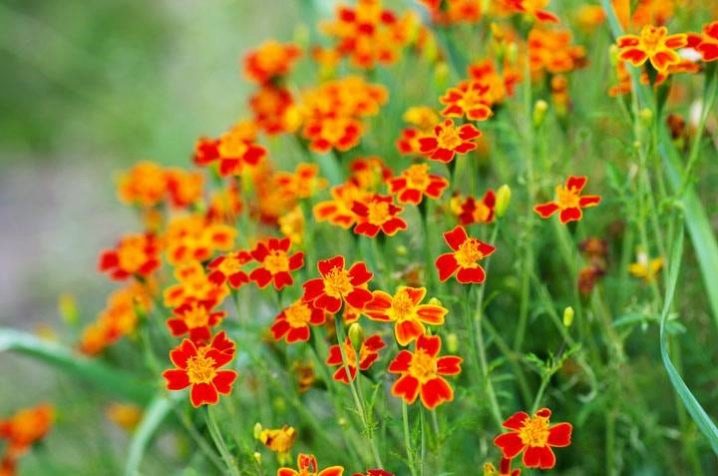
- Marigold dwarf bush "Orange gnome" with narrow foliage and small, simple flowers of five yellow petals with an orange spot at the base, it is well suited for ridges, containers, border decoration and other design solutions.
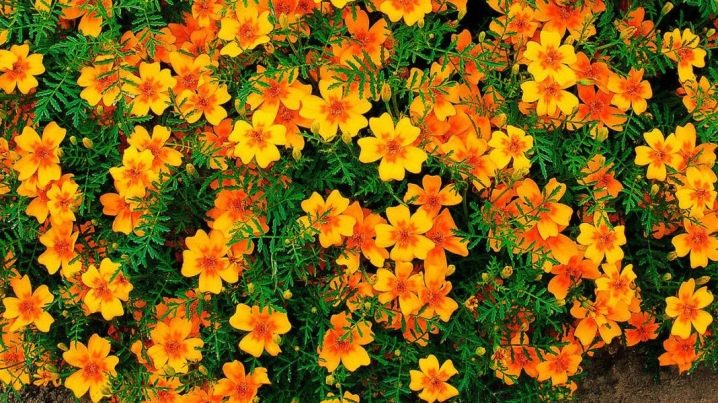
- Golden orange color of small Mexican species "Ursula" pleasing to the eye, creating such a dense cover of a small bush that you cannot see the ground behind it.
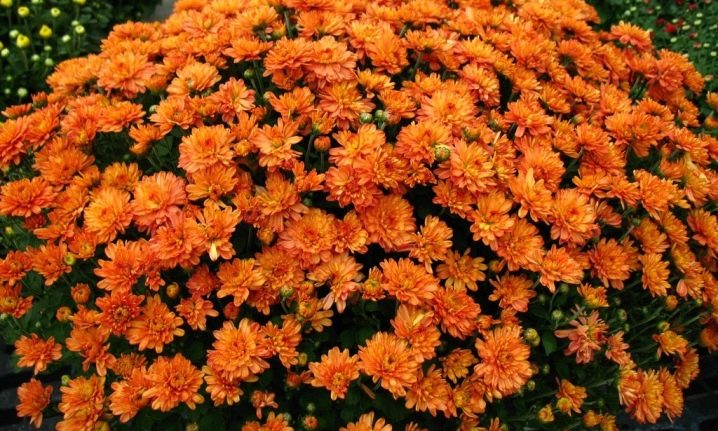
- Series "Gems" consists of openwork spreading plants dotted with small red, golden or yellow single-row flowers.This variety looks good along the edge of garden paths, the perimeter of flower beds, or near fruit trees.
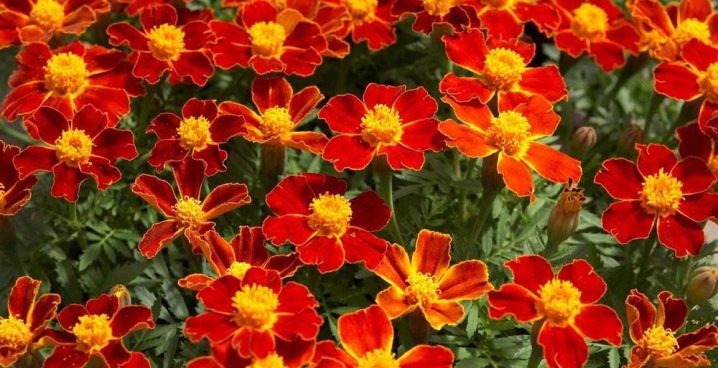
- Sun-yellow small non-double flowers varieties "Lilu lemon" a dense carpet is covered with a sprawling, highly branched bush with a height of 0.3 m. The variety is suitable for growing in the form of a pot culture.
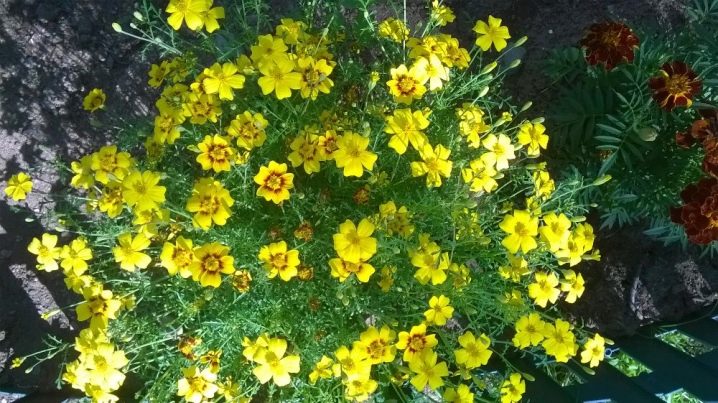
Color variety
In their natural environment, the Tagetes color palette covers all shades of red and yellow. But the long-term work of breeders has made it possible to obtain varieties with different shades from white to greenish and cover the entire palette from yellow to burgundy tones. Some of the shades, due to the peculiarity of color perception, can be mistaken for lilac with a slight stretch.
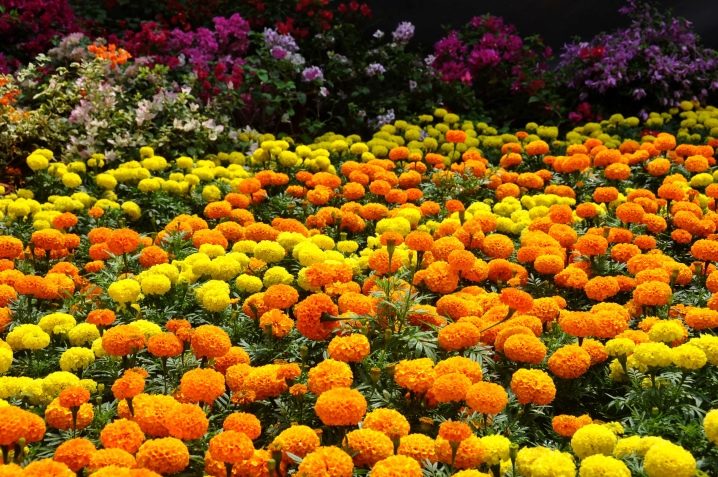
Due to the richness of colors and the variety of shapes of flowers and bushes, marigolds are ideal for creating floral paintings that do not lose their decorative effect throughout the summer period.
One of the shades not inherent in Tagetes is blue. Blue, blue or purple marigolds widely advertised on Chinese trading platforms do not exist in nature. Blue shades in these sunny colors are obtained by the introduction of a special paint.
Monochromatic inflorescences and flowers, including several shades, delight the eye with their diversity all summer.
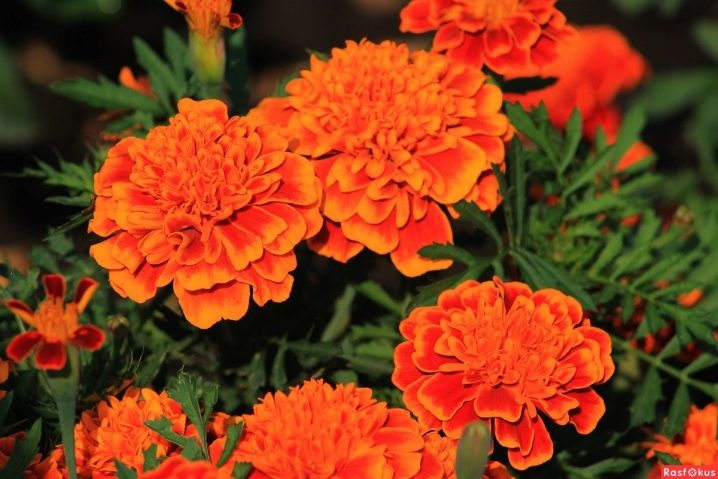
Tagetes "Solar giants" - the largest yellow flowers from the erect group. Clove-like very double inflorescences about 170 mm in diameter rise to a height of one meter.
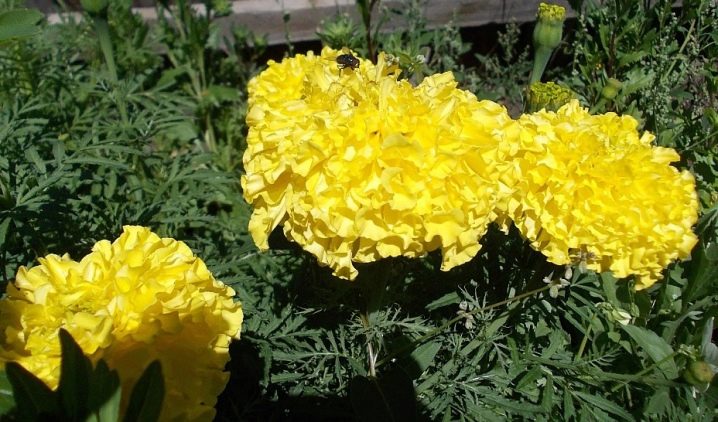
Hybrid series upright type "Giant Towers" it is distinguished by very large double flowers with a diameter of up to 170 mm on stems about 1 m high. The flowers are suitable for cutting and landscaping.
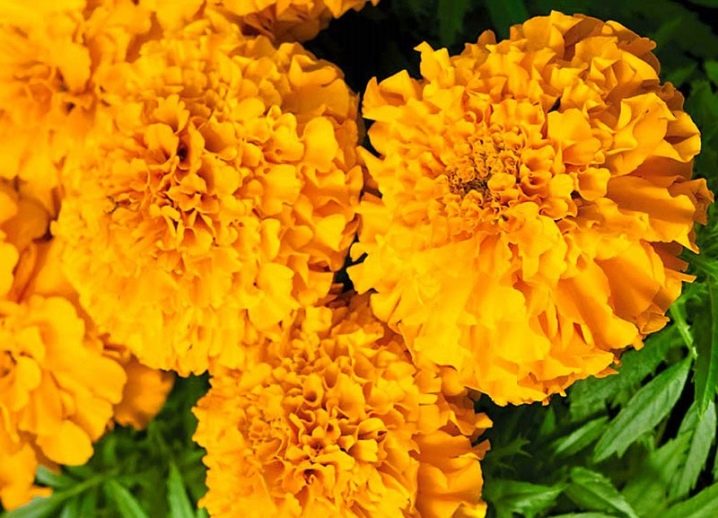
Tagetes series "Fantastic" combines strong tall plants with chrysanthemum-like flowers of yellow-gold, bright yellow and orange shades.
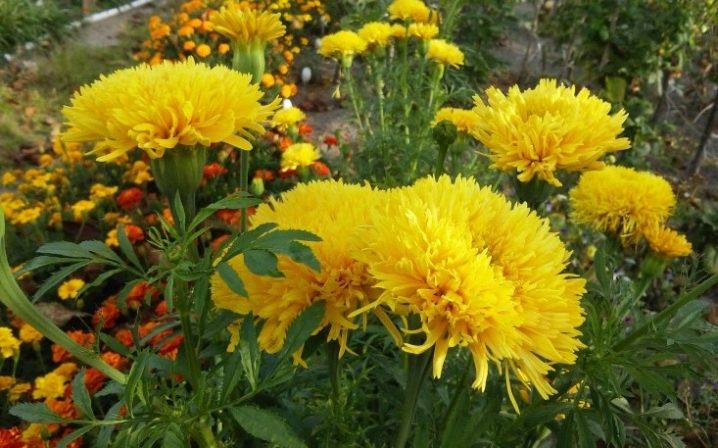
New hybrid "Vanilla" possesses beautiful, very large - up to 120 mm - spherical lemon-cream inflorescences in the center, turning into a delicate shade of ivory to the lower row of petals. Strong shoots with a height of 0.7 m have dense bright green foliage. The hybrid is good in compositions: it emphasizes the structural brightness of other colors or creates light spots among dark greens.
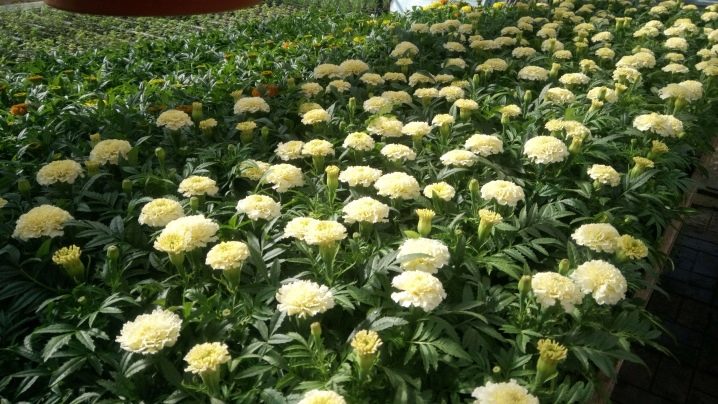
Orange "Hercules", like the mythical hero, is distinguished by straight, strong high shoots, easily withstanding the caps of ten-centimeter buds. The plant is suitable both for landscaping the site and for creating bouquets as cut flowers.
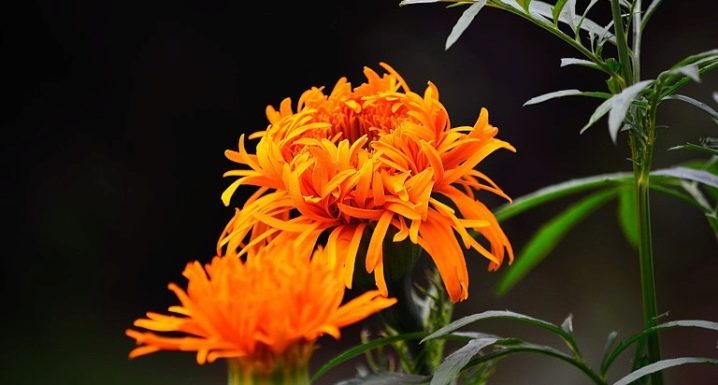
Erect marigolds series "Kalando" They are distinguished by a low, strong bush, covered with lemon-yellow strongly double flowers up to 90 mm in size.
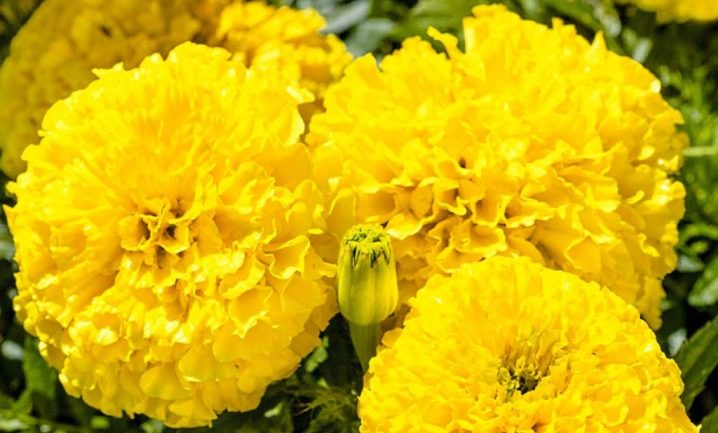
One of the earliest flowering new varieties - hybrid "Snow blizzard"... Terry, 60–80 mm in diameter, delicate white inflorescences with a lighter aroma than their orange counterparts, cover low, strong bushes with dark green foliage.
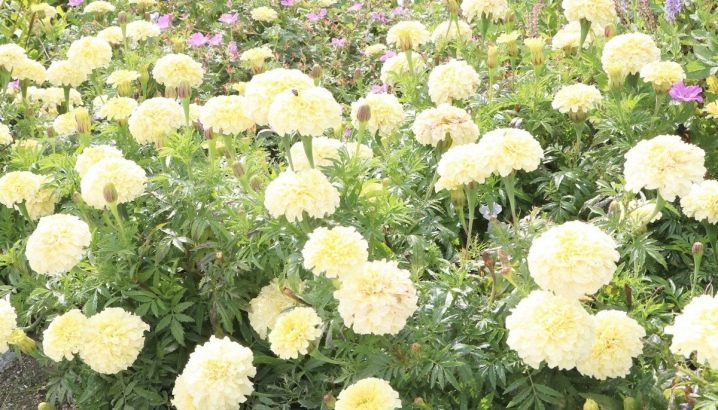
Unique coloration of French marigolds "Aluminum" will serve as a decoration for balconies and garden vases. Delicate flowers with a touch of vanilla cream, up to 60 mm in diameter, cover strong compact bushes up to 0.3 m high.
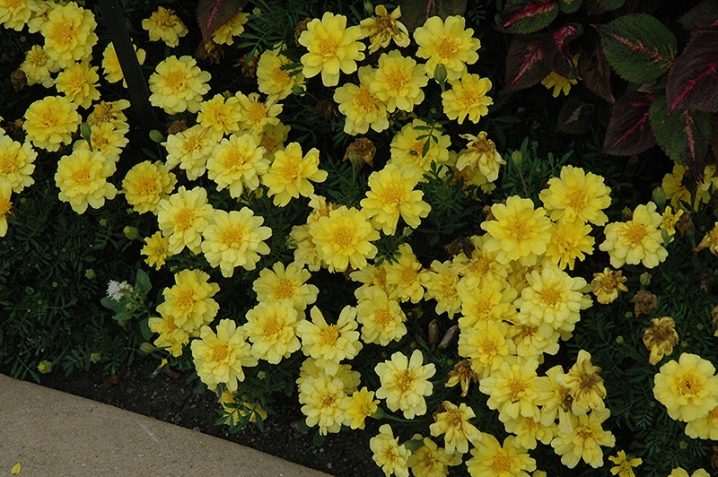
Marigold varieties "Mandarin" are included in the rejected group. A short, compact, ball-shaped bush decorated with citrus-colored terry inflorescences, the name given to the variety.

Small-colored tagetes "Fire ball" in bloom, they resemble a small bonfire of tongues of flame of different shades of orange, surrounding a strong compact bush, covered with double flowers.
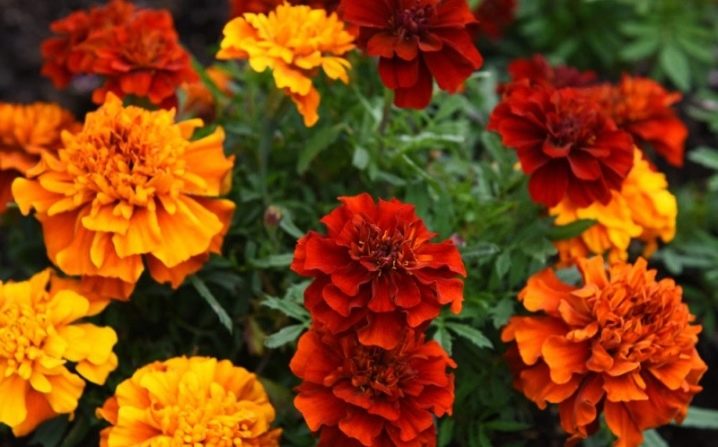
American hybrid of upright and rejected marigolds "Strawberry blond" differs in a unique changing color from dark red in the only blossoming, to pink, and then yellow-apricot in mature flowers. Clove inflorescences with a diameter of 50-60 mm adorn a wide bush at the base up to 0.25 m high.
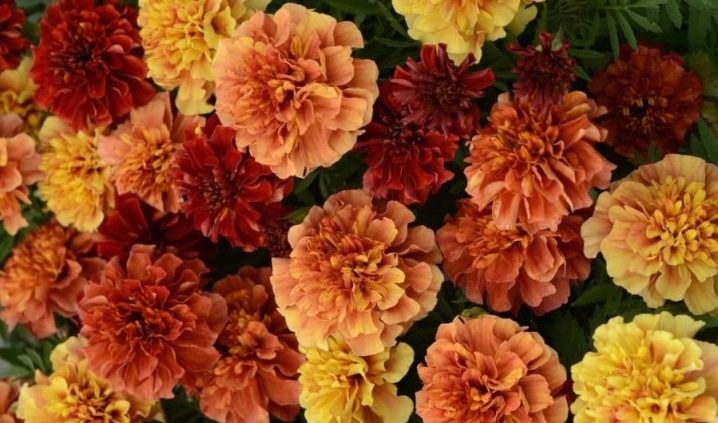
Varieties of marigolds series "Bonita" include the best shades of reds, yellows and oranges.Large - up to 70 mm - densely double inflorescences on dwarf plants will ideally fill empty spaces, highlight a path, highlight the beauty of other flowers.
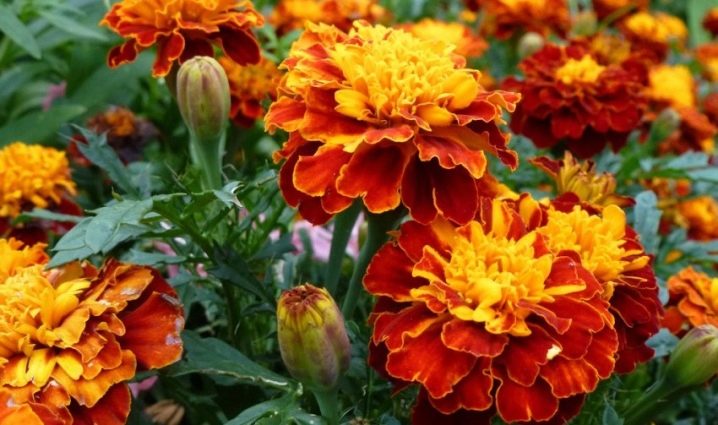
Beautiful examples in landscape design
The use of tagetes is widespread in landscape design. In almost any settlement you can find flower beds or flowerpots with bright sunny flowers. Many owners use "black shavers" to decorate their land plots and areas around the house.
- Bright orange pom-poms of undersized varieties surrounded by silvery cineraria create a beautiful combination of colors against the backdrop of a bright green lawn.
- Dwarf species of the same variety with terry flower caps, planted in a wide semicircular flowerpot, will add a unique charm to the surrounding space.
- A carpet pattern of plants of the same height, but different in color and flower shape, will decorate the square or the adjacent territory.
- A chic peacock spread its tail along the green lawn, decorated with even spots of bright shades of dwarf marigolds.
- Planted in pots or other containers, low-growing marigolds will serve as a bright decoration for balconies or porch areas.
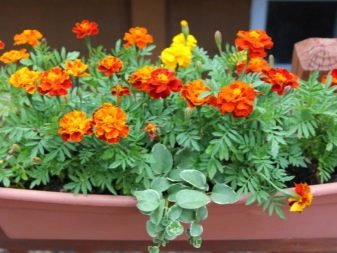
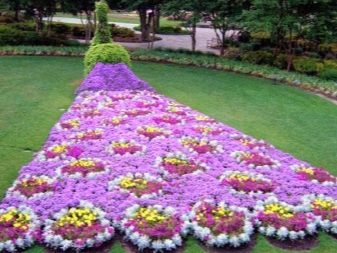
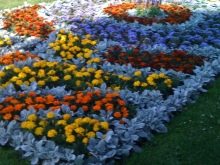
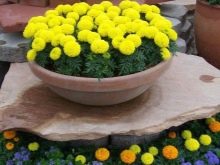

There are a lot of options for using an unpretentious sunny flower. Their quality and quantity are limited only by the imagination of the author.
For information on how to grow marigold seedlings from seeds, see the video below.




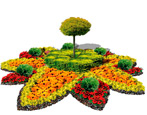
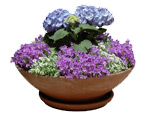
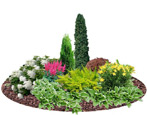
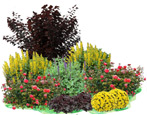


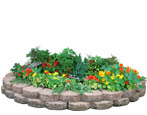
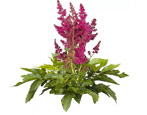

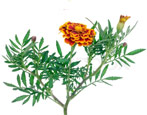
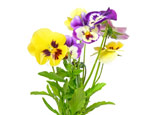

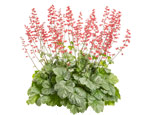

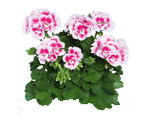
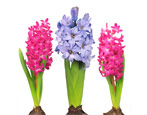


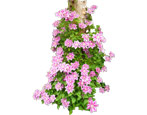
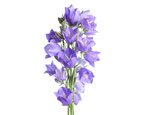
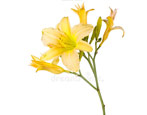
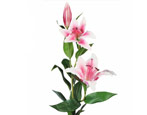
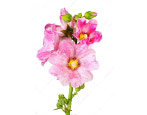

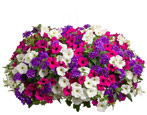
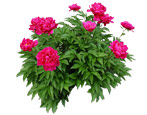
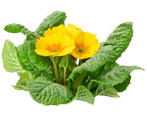
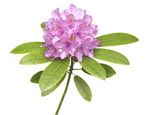


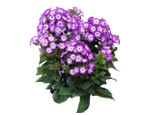
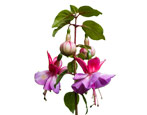
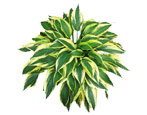
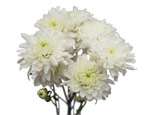
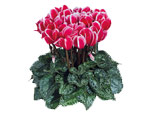
































































The comment was sent successfully.